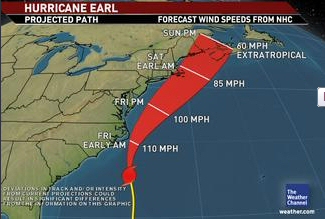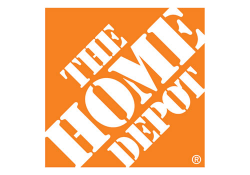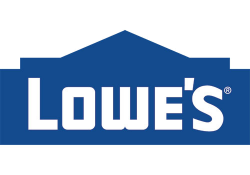
 As Hurricane Earl makes his way up the Atlantic coast, we have a tangible reminder to review our homeowners insurance policies for hurricane and tropical storm deductibles and exclusions.
As Hurricane Earl makes his way up the Atlantic coast, we have a tangible reminder to review our homeowners insurance policies for hurricane and tropical storm deductibles and exclusions.
Hurricane insurance deductibles can have a dramatic affect on how an insurance company will compensate you in the event your house is damaged in a storm. All too many homeowners find out about these limitations for the first time in the aftermath of a storm, when stresses and tensions are already high and losses are piling up.
What Are Hurricane & Tropical Storm Deductibles?
For those who live in areas rarely or never affected by hurricanes and tropical storms, a special deductible that applies only to “named storms” is probably a new idea. Simple stated, these deductibles limit the amount of money an insurance company will pay you if your house is damaged by a storm, either directly or indirectly.
The deductibles are usually expressed as a percentage of the value of your home’s coverage. For example, you might see language that says “Named storm deductible – 5%” on your policy declarations page. While this percentage may sound small, the deductible is calculated by multiplying the percentage by the entire coverage value stated in the policy.
For example, if you have $500,000 of coverage on your home, the applicable deductible is a whopping $25,000! That means you have to pay for the first $25,000 in repairs before your insurance company will contribute a dime to helping you rebuild. If the repairs fall short of $25,000, you’ll cover the entire cost out of pocket.
What is a Named Storm and How Is the Term Used?
Some insurance companies use the term “named storm” to classify storms that are included in the deductible limitations, while other companies will limit coverage for all windstorms. A named storm is usually defined as a storm that is given a name by the National Oceanic and Atmospheric Administration (NOAA). Names of storms are pre-planned (a list of them can be found here) and dolled out to storms that meet the criteria for classification.
By relying on a storm’s named status, insurance carriers can remove some of the ambiguity around whether a particular wind storm is affected by the limitations.
What are Typical Hurricane Insurance Deductibles?
While not all policies include hurricane and tropical storm limitations, those that do can range anywhere from 1% all the way up to 100% of the property. When they are 100% excluded, they are no longer described as “deductibles” but rather as “exclusions” or “limitations.” Unfortunately, there is no benchmark for what is typical, because disaster risk varies significantly between geography, location, house type, and more.
That said, it is important to realize that not all insurance companies provide identical coverage, even in the same areas. For example, in Baltimore County, Maryland, Allstate has a 3% hurricane deductible, while Geico and other companies have no such limitation. Even individual insurance company policies will vary by state.
To find out what is typical in your area, there’s really only one way to go about it: get multiple quotes. You can use an online service to do this for you, call each company individually, or get a broker to help out. When discussing your options with the company, let them know what is important to you. For example, if you absolutely don’t want to bear a large risk for a named storm, state that as your goal up front. It will save you and them a lot of time.
Insurance Dispute Rights
Rights for insured persons vary heavily by state, so you should contact your state’s insurance regulatory body to understand what limitations might be imposed on insurers in your state in terms of exclusions and limitations. Be aware, however, that tropical storm deductibles and exclusions are generally legal and binding. Once a hurricane causes the damage on your house, the time has passed where you can shop around or negotiate the deductible.
What do you think? If you live in hurricane alley and are affected by a deductible like this, please let us know in the comments.
(image: weather.com)

Have you ever wondered what would happen if you just cancelled your homeowner’s insurance policy? Will the mortgage company let you cancel it? Will they buy coverage for you? Could you get a better deal that way?
We recently switched our homeowner’s insurance from Allstate to Geico. During the switch there was some mix up with the paperwork going from Geico to Wells Fargo, the company that holds our first mortgage.
Wells Fargo sent us a letter telling us that they didn’t have insurance information and they were going to purchase it on our behalf. They even included details of the new plan they were purchasing from American Security Insurance Company:
- $3,245.00 annual premium for $338,000 of dwelling coverage only.
- optional $210.00 annual premium for $40,000 of personal property coverage and $25,000 of personal liability coverage.
Contrast this to the plan we actually signed with Geico, which provides $325,000 in dwelling, $500,000 in personal liability, and over $100,000 in personal property insurance for just over $1000 annually.
Will a Mortgage Company Let You Cancel the Policy?

Obviously, the answer is yes. But, just like Wells Fargo, most mortgage companies will purchase insurance on your behalf at a cost 2-3 times more than what you can purchase on the market. Also, the mortgage company will buy coverage only for their secured asset (the dwelling) — none of your goods inside will be covered. Further, they may only purchase enough insurance to cover the outstanding loan amount, not the entire dwelling. So if the house burns down, the mortgage company gets paid, but you don’t.
And, you’ll still be paying for the coverage, by way of increased monthly payments due to an increased draw on your escrow account. If you fail to make the payments, the mortgage company will foreclose your loan.
Are you Required to Carry Homeowner’s Insurance?
If you have a mortgage, then yes, you are. When you signed the loan documents at closing, they included a requirement for you to maintain adequate coverage on the dwelling — the minimum being the loan balance due to the lender. If you fail to maintain coverage, the lender can foreclose on your property even without buying the coverage for you. But, they usually won’t – because they’d rather you make the payments, and they’ll just buy the insurance to cover themselves.
You do have a right, however, to pick whatever reputable insurance company you want to provide coverage on your property. The mortgage company can require the insurance provider to be a certified provider in your state, but otherwise, they are prohibited from dictating the actual insurance company you use (this rule is in place to prevent the mortgage company from requiring you to work with a company with whom they are affiliated.)
If you don’t have a loan, there’s no requirement for you to have homeowner’s insurance — but it would be foolish not to given the relatively low cost and the potential risk.
Let Your Lender Know of the Switch
The easiest way to avoid the headache of a mix-up is to call your lender as soon as you make the switch and give them the new policy # and details. Wells Fargo was great in that when we provided insurance information to them and showed them that no gap existed between the two policies, they didn’t charge us any fee for the ‘temporary’ policy they had purchased on our behalf.
(photo: David Hillowitz)

 We just saved a bunch of money by switching our car insurance to Geico!
We just saved a bunch of money by switching our car insurance to Geico!
I’ve always wanted to say that 🙂
But seriously, we did just switch all of our policies over to Geico from Allstate.
We’ve been in the “good hands” for about 6 years. Turns out that those hands are also expensive.
And they’re not as good as they used to be…
I wrote last year about Allstate’s new tropical cyclone deductible, which would make a homeowner pay a 3% deductible before covering any damages caused by a named storm. And by 3%, I mean 3% of the value of the house, not 3% of the damages. That would make our deductible more than $10,000 before Allstate chipped in a dime for a disaster like that.
So I’ve been meaning to switch our coverage since that notice came out, but like so many things it slipped by. Since all of our policies renew on April 15, I decided it was a good time to look around and see if we could do better.
I’ll bet every one of our American readers has heard at least a dozen Geico insurance commercials. They’re everywhere; they’re catchy, and they make bold claims… 15 minutes could save us 15% or more on our car insurance by switching. I’ll be honest, I didn’t really buy it.
But, when I Googled for “home insurance quotes”, I discovered Geico offers homeowners and landlord insurance. I figured I’d give the 15 minute claim a test. (I learned later that Geico Homeowner’s insurance and Landlord’s insurance is underwritten by Travelers).
The phone call took a lot more than 15 minutes… It actually took about an hour to get everything squared away.
I won’t bore you with all the details, but here’s how the numbers panned out…
Auto Insurance Comparison
We have a 2003 Toyota Corolla and a 2006 Dodge Grand Caravan. We live in a busy suburb of Maryland.
- Allstate: $978 / 6 months
- Geico: $567 / 6 months
–> Geico is $822 cheaper for 12 months.
Homeowner’s Insurance Comparison
For $400,000 of coverage on the structure with good coverages for other aspects.
- Allstate: $1216 / 12 months
- Geico: $1176 / 12 months
–> Geico is $40 cheaper for 12 months.
Landlord Insurance Comparison
For $175,000 coverage on the structure with good coverages for other aspects.
- Allstate: $482 / 12 months
- Geico: $605 / 12 months
–> Geico is $123 more expensive for 12 months.
Umbrella Insurance Comparison
For $1,000,000 in additional liability protection.
- Allstate: $355 / 12 months
- Geico: $182 / 12 months
–> Geico is $173 cheaper for 12 months.
Total Savings Switching to Geico
All told, Geico came out $912 less than Allstate for identical coverage, or about 25% less. We actually reduced some of our structure coverages because Geico advised us that we simply didn’t need as much as we were carrying, for an additional savings of about $200.
Of course, Geico doesn’t have the tropical cyclone deductible–at least not in Maryland–which is a huge plus.
Now, we’re not wed to Geico. If another reputable company can best their offer, we’re game. In fact, companies like 2Insure4Less will send you quotes from multiple insurance companies by e-mail.
But we will stick with them for the next 6 months at least, since we spent their time getting signed up. And I will ride the ‘savings high’ for a little while…
Goodbye good hands. Hello, gecko!

 Perpetual homeowner’s insurance is a rather rare insurance option most of us don’t ever consider for our homes.
Perpetual homeowner’s insurance is a rather rare insurance option most of us don’t ever consider for our homes.
Unlike traditional home insurance that is paid annually–usually by a mortgage company out of an escrow account–perpetual home insurance requires a single up front payment and covers your property perpetually. When you don’t need the coverage anymore, your deposit is returned to you.
How Much Does Perpetual Insurance Cost?
In the simplest terms, you could say perpetual insurance is free. You make a one-time payment (called a deposit premium), and when you no longer need the coverage, the deposit premium is returned to you.
But the simplest terms really don’t capture the essence of the proposition.
The deposit required for perpetual insurance is usually 15-20 times the annual cost of traditional insurance. The perpetual insurance company invests the deposit and uses the proceeds of investment (e.g., interest and dividends) to cover claims, administrative costs, and of course, profits. Since the insurance company has your deposit, you lose the ability to invest it in alternatives, like stocks, bonds, savings accounts, or CDs.
For example, if an annual insurance policy costs $1000/year, a perpetual insurance equivalent would probably require a ~$16,000 deposit.
Why Choose a Perpetual Homeowner’s Insurance Plan?
The best reason to choose a perpetual homeowner’s plan is for the tax benefits.
Payments for traditional homeowner’s insurance are not tax deductible. That is to say, if you pay $1000 / year for insurance and you are in a 25% marginal tax bracket, you must earn $1,333 dollars to pay the insurance plan. (25% of $1,333 is $333 – the portion that is taken by the Government).
The non-cash insurance benefit from a perpetual insurance company, however, is not taxed as income to the recipient.
All things being equal, a perpetual insurance company offers the opportunity to pay for your homeowner’s insurance tax-free.
Another reason to choose perpetual insurance is the fixed rate/$1000 of insurance that often accompanies a perpetual insurance policy. This allows you to purchase additional insurance as your property value increases at a pre-defined purchase rate.
What Are the Risks?
While it may at first seem that the $15,000 deposit premium is the most significant component of the risk, it is not. As with any insurance decision, the most important question is whether the company is prepared to pay in the event of a substantial claim.
This is a question that should be asked of all insurance companies, both traditional and perpetual. It would serve a purchaser well to investigate the company and its financial performance before signing up.
Fortunately, in the United States there are considerable capital retention regulations placed on most insurance companies that provide additional guarantees to the insured.
That said, the $15,000 deposit is still at risk with the company. Unlike with traditional insurance companies where you are only risk is in the event of a claim, with a perpetual company you constantly have the deposit premium at risk.
Essentially, you are gaining the tax and fixed purchase-rate benefits at the expense of increased risk.
Evaluating Perpetual Insurance Investment Performance
If we assume perpetual insurance costs 16 times an annual insurance policy, that means an average tax-free return of 6.25%. If you’re in the 25% tax bracket, this is equivalent to an 8.31% return.
You can then compare this with other taxed and tax-free options (like municipal bonds), to determine whether the investment makes sense.
Of course, the 16x assumption is important. If the number rises, to say, 25X, it may be better to invest in something else and simply buy the traditional, annual option.
Perpetual Insurance vs. Traditional Insurance
Given that you are investing a sizable lump sum of money into a single company, we think perpetual insurance makes sense only for those people who have:
- More than $100,000 in non-home, non-retirement investment assets.
- Are in a tax bracket at least 25% (the higher your bracket, the bigger the advantage).
- View their perpetual policy as a component of an overall, coordinated investment strategy.
- Have no high-interest credit card or other debt.
- Are willing to put in the effort to evaluate the insurance company.
For everyone else, we think it doesn’t make sense to tie up such a large portion of investable assets into a single investment vehicle.
What do you think? Do you have perpetual insurance? Would you consider it for your home?
(photo: powi)






